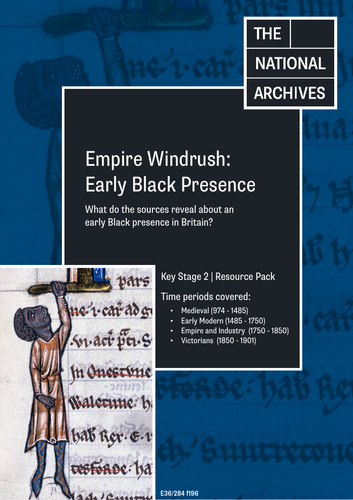

What do the sources reveal about an early Black presence in Britain?
Black people have lived in Britain for over two thousand years. Some came to Britain with the Roman invasion in 43CE and they became an important part of British society throughout the medieval ages and beyond. Evidence shows that Black people joined the armed forces, married in parish churches, made significant contributions to art and writing, and resisted and challenged the repressive laws of the day. We cannot tell the history of Britain without including their stories.
In the early years of the First World War, many Caribbean men bought tickets to sail to Britain to join the army. The British West Indies Regiment was created, playing an important role in the conflict. Men from Nigeria, the Gold Coast, Sierra Leone, the Gambia and other parts of Africa, also fought for Britain. At the end of the war, many African and Caribbean soldiers decided to stay in Britain to make it their permanent home. Race riots broke out in parts of the country during the early months of 1919, as some white communities blamed black people for the shortage of work and housing caused by the war.
During the Second World War, black people from across the Commonwealth fought for Britain once more. Some were soldiers, whilst others came to support work on the Homefront such as factory production and nursing.
After the war, Britain needed to be re-built. By 1948, the Nationality Act was passed; allowing people from British colonies the right to live and work in Britain if they wanted. Other people from Europe were also invited to Britain. Many people from the Caribbean left their homes to begin a new life in Britain, bringing with them a wide range of skills. They filled jobs in the transport system, postal service and health service, helping Britain to re-build and recover.
These people are often called the ‘Windrush Generation’, named after the ship ‘The Empire Windrush’ that docked at Tilbury in June 1948. Windrush was not the first ship to bring Caribbean migrants to Britain; the Ormonde and Almanzora had arrived in Southampton the year before.
Between 1947 and 1970, nearly half a million people left their homes in the Caribbean to live in Britain.
Something went wrong, please try again later.
We are pleased to let you know that your resource Empire Windrush: Early Black Presence, has been hand-picked by the Tes resources content team to be featured on https://www.tes.com/teaching-resources/black-history-month in August 2024 and https://www.tes.com/teaching-resources/blog/resources-support-black-history-month in September 2024. Congratulations on your resource being chosen and thank you for your ongoing contributions to the Tes Resources marketplace.
Report this resourceto let us know if it violates our terms and conditions.
Our customer service team will review your report and will be in touch.